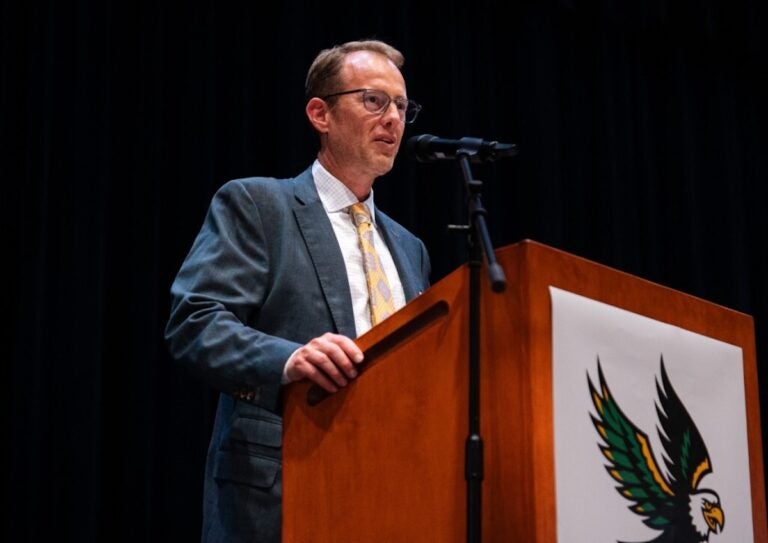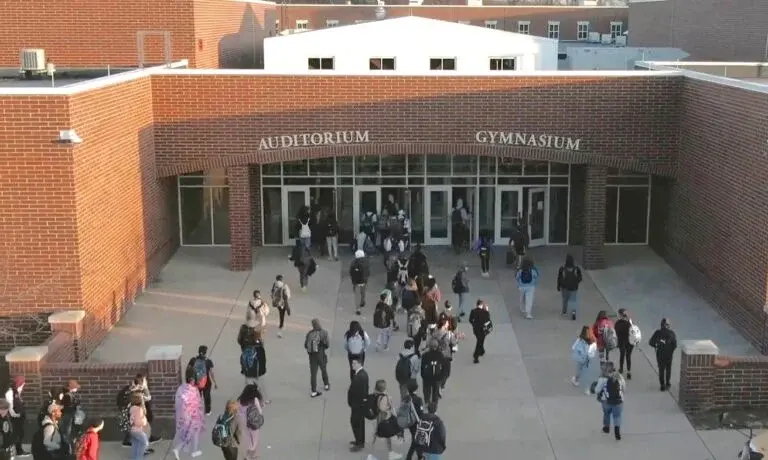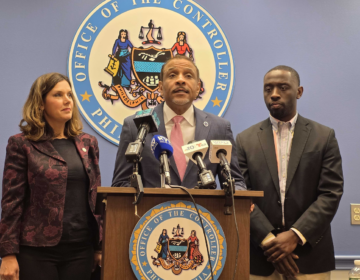‘Blindsided’: Delaware auditor says multiple financial reporting failures triggered school district’s fiscal crisis
Auditor Lydia York’s report finds fault with how Appoquinimink’s superintendent, finance chief and school board oversaw finances.

The auditor's review faulted Matthew Burrows, Appoquinimink's superintendent, for his 'fiscal stewardship.' (Appoquinimink School District)
What are journalists missing from the state of Delaware? What would you most like WHYY News to cover? Let us know.
A series of financial failures by leaders in Delaware’s fastest growing school district triggered a multimillion-dollar budget shortfall this summer and a 10% property tax increase that “blindsided” residents, the state auditor has found.
Auditor Lydia York told WHYY News that while a “special inquiry’’ her office released today didn’t uncover any suspected criminal behavior at Appoquinimink School District, “sloppiness’’ across all levels of district financial governance contributed to the crisis.
“Appo,” as the Middletown-area district is known, has more than 13,000 students, the second most of Delaware’s 19 districts.

The district’s predicament was revealed publicly in July, when officials announced that Appo’s bank accounts didn’t have enough to cover two biweekly payroll periods, as required by state regulation. That led the board to boost the tax rate without going to referendum, and Superintendent Matthew Burrows to announce cost cuts.
The auditor’s review found that Appo was $2.1 million short of what was needed to meet monthly payroll for June.
The review found fault with Chief Financial Officer Eric Loftus, who resigned suddenly this summer, as well as Burrows and the school board. The review found that for the last three budget cycles, “the district significantly under-projected expenditures.”
Expenses were $1.7 million greater than projected in fiscal year 2023, $6.4 million higher in fiscal year 2024 and $7.2 million in fiscal year 2025, which ended June 30, the report found.
“Our findings reveal failures in budgeting, reporting, and review that have resulted in Appoquinimink running large deficits for several years running,” the review said.
While not naming Loftus, the auditor’s review said the chief financial officer supplied summary information to a district financial advisory panel that was incomplete.
Loftus “did not include meaningful supporting documentation to demonstrate their appropriate beginning balance, or to compare the budget” to actual spending,’’ the auditor’s review said. “The CFO failed to properly support the district’s fiscal operations as intended.”
York said auditors found no evidence that the advisory panel “ever actually met” during the last three years.

The review also didn’t name Burrows, but said the superintendent “did not fully meet policy obligations regarding fiscal stewardship, accurate reporting, and transparent communication. Stronger accountability measures will be required to ensure fiscal health moving forward.”
The five-member board relied on Burrows for information about the district’s fiscal health but also could have done more, the review concluded.
The board “missed several opportunities for stronger governance to prevent or at least reduce the severity of their current revenue shortfall,” the review said.
“Tougher questioning of budget assumptions, proactive use of the [advisory panel] and transparent communication with the public could have provided time to determine alternative solutions to avert their shortfall.”
The board could have informed the public about “the emerging shortfall” earlier because warning signs “like low reserve levels” were evident months earlier, the review found.
“By delaying disclosure, they not only blindsided families with a 10% increase of prior year current expense tax revenue but also damaged public trust,” the review said. “A more transparent, staged communication strategy could have helped residents understand the challenges and prepared them for necessary measures.”
The tax hike came after district officials made several assurances to the public that none would be needed. The board didn’t have to seek voter approval in a referendum because the recent statewide reassessment of property values allowed them to take the action unilaterally.
York’s office has made a series of recommendations to avert future problems at Appo and perhaps other districts, but said in an interview that she won’t refer the matter to Attorney General Kathy Jennings for further investigation and possible prosecution.
“We did not see what we would think of as the hallmarks of bad behavior,” she said. “We don’t see wrongdoing. We see serial omission and a failure to correctly render these reports to the people who needed to see them to take decisions that the board needs to take.”
The bottom line, York said, is that “bad data” kept the board and the public in the dark.
“If you’re not paying attention to something somewhere along the way or you become invested in a bad number that doesn’t get fixed, you start to skew the informational landscape and it becomes very difficult,” she said. “Here we had bad data writ large.”
Loftus could not be reached. Burrows would not agree to an interview but said in a written statement the review’s findings “echo the information we’ve shared with our district staff, families, and community regarding errors that resulted in major budget forecasting issues.”
Burrows insisted that “while the state auditor’s report indicates that the district was aware of financial shortcomings for some time,” his office didn’t know until late May. At that point Appoquinimink hired outside financial experts “who made the district aware of the full impact of the budgeting errors – including underestimated employee costs.”
Appoquinimink has already hired a new finance director, has outside experts reviewing records, is increasing training and making other improvements, Burrows said.
“We are committed to the path forward, which includes frequent communications with our families and community,” Burrows said. “We understand that we must rebuild trust with our community, and we will work tirelessly to ensure that happens.”
York said she credits Appoquinimink for already starting to reform its financial processes.
Burrows and his staff have been “very receptive to our work and they are doing some of their own work to fix some of these problems,” York said. “I believe that they are probably on a better path for sure to do the things that they say that they’re supposed to be doing.”
This story was supported by a statehouse coverage grant from the Corporation for Public Broadcasting.

Get daily updates from WHYY News!
WHYY is your source for fact-based, in-depth journalism and information. As a nonprofit organization, we rely on financial support from readers like you. Please give today.








